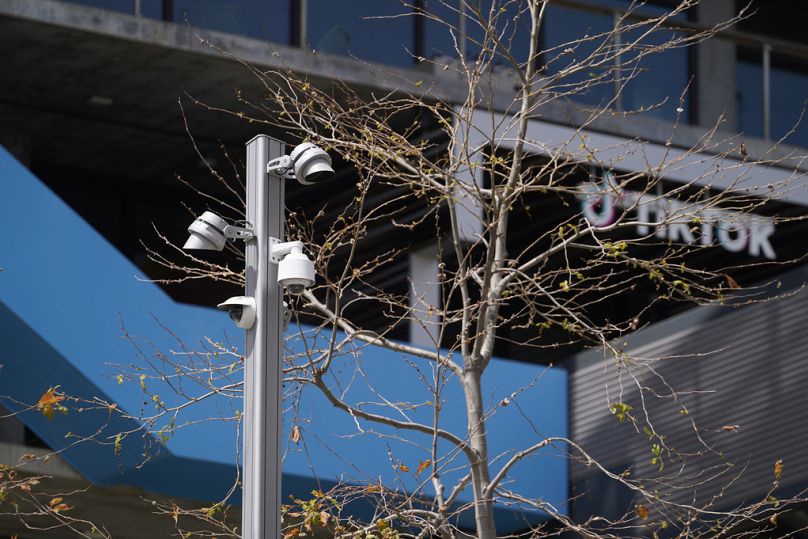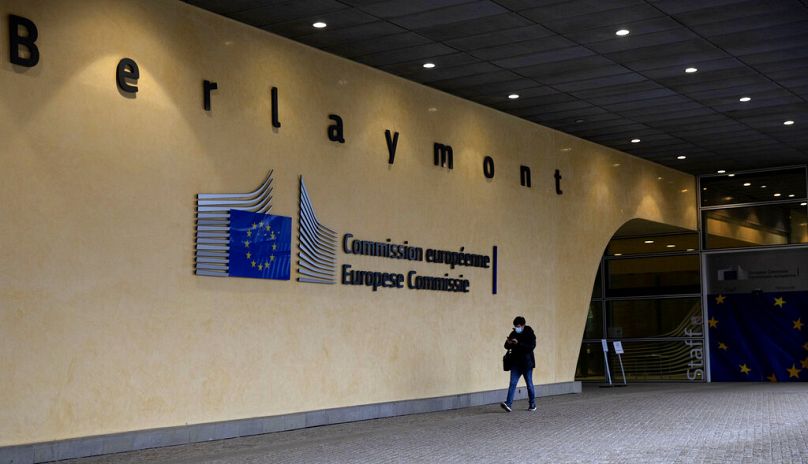When the DSA and DMA were passed in 2022, major tech industry associations praised the new laws as significant achievements. It is time for Big Tech corporations to stop pouting and live up to their responsibility, Jan Penfrat writes.
As the EU's new flagship tech laws, the Digital Services Act and the Digital Markets Act, are coming into full application, Big Tech is working hard to shoot them down.
As of today, the Digital Markets Act (DMA) becomes fully applicable, following its counterpart the Digital Services Act (DSA) on 17 February.
However, as the EU's new tech laws are coming into full application, tech corporations like Apple, Amazon, Meta and TikTok are already undermining them at every turn.
To subvert these new regulations, tech corporations have filed a number of lawsuits against the European Commission and attempted to weaken the rules with malicious compliance that protects their profits at the expense of their users.
Malicious compliance pretends to follow the letter of the law in such a way that ignores or otherwise sabotages the law's intent.
That's why civil society organisations like EDRi are holding tech corporations to account for their actions and support the European Commission in fully utilising its oversight authority.
The DSA regulates how social media platforms deal with potentially illegal online content uploaded by their users, without unduly limiting people's freedom of expression.
The DMA contains powerful obligations and prohibitions to prevent those tech firms from monopolising key markets like smartphones, chat apps, app stores, and more.
Tech corporations are not happy — they prefer profit over people
As the European Commission gears up to enforce Big Tech's compliance with the new rules, Amazon, Meta, TikTok and Apple are emptying their pockets in an attempt to thwart that task.
In July, Amazon was one of the first to sue the European Commission over the DSA. The half-a-trillion-dollar company, with hundreds of millions of European users every month, argues in court that it cannot possibly be the target of the DSA's key obligations because they were conveniently meant for companies with online advertising as a primary business model, not for Amazon.
Of course the DSA's obligations for very large online platforms such as Amazon too, and explicitly extend to e-commerce sites, regardless of how they make their money.
Not long after, Meta and TikTok announced they were dragging the European Commission to court over the annual supervisory fee they are required to pay under the DSA.
This obligation is one of the many wins digital rights organisations like EDRi and other civil society groups achieved during the drafting of the law. It's a matter of fairness that Big Tech bears the costs which society must invest to mitigate the threats those companies pose, an estimated €45 million per year.
Based on the European Commission's calculations, Meta ($47 billion in annual profits) should pay €11m while TikTok's owner ByteDance ($2bn in annual profits) is expected to pay €3.9m.
Let’s do the maths: Both sums are way below the maximum limit of 0.05% of their annual profits. While these amounts are mere pocket money to the tech corporations, they are a fair and indispensable financial compensation that enables public authorities' enforcement work.
Apple is not without fault, either
Apple, on the other hand, is trying to squash the new regulations not in court, but by way of malicious compliance. One of the DMA's primary goals is to break open Apple's tightly controlled operating system and app store and to enable users to freely decide which apps they would like to install on their iPhones and from where.
Instead of complying with this new requirement, however, Apple has announced a sneaky plan that would technically allow competitors to provide alternative app stores and web browsers on iPhones and iPads, but would in no way reduce the company's gatekeeper power over people's devices.
Instead of enabling real software freedom for its users, Apple continues to police every single app people install on their phones and extort a levy from their developers, allegedly to keep users safe.
Developers have called Apple “a mafia” and described its attempt at malicious DMA compliance as “abusive,” “extortion,” and “ludicrously punitive.” The European Commission should push back hard against this attempt to circumvent the DMA’s purpose of reducing gatekeeper power.
To be sure, legal recourse is open to everyone. Some of these legal cases brought by tech corporations, however, seem to have no merit other than to delay the European Commission’s enforcement work, depress the DSA's and the DMA's potential to reduce Big Tech’s market power and destroy the two laws' positive image in the public eye.
Will the European Commission hold tech corporations accountable?
Despite the legal threats from industry, the European Commission’s enforcement teams have gotten off to a rather promising start.
Last year, the team responsible for the DMA ran a set of well-organised public workshops with experts and regulated companies to discuss how to best apply some of the law’s trickier rules.
Unlike similar workshops in the past, these were not dominated by industry lobbyists but hosted a number of important civil society voices, including from the free software and digital rights communities.
More importantly, when the DSA came into force, the European Commission pretty quickly sprung into action and opened formal investigations into X (formerly known as Twitter) and TikTok for potential non-compliance with their respective obligations under the DSA.
Among others, the European Commission investigates whether the two platforms have failed to comply with their obligation to provide effective content moderation, improve the transparency of their surveillance advertising systems, and stop using addictive design and dark patterns.
Civil society's fight for accountability and justice
Just last week, EDRi together with other expert NGOs provided evidence to the European Commission indicating that Microsoft’s networking platform LinkedIn may be in breach of the DSA's new prohibition to profile people using sensitive personal data for ad targeting.
The mere fact that the DSA contains such a prohibition is a significant milestone, acknowledging the limits of consent in the context of the surveillance ads industry.
When the DSA and DMA were passed in 2022, major tech industry associations praised the new laws as significant achievements. It is time for Big Tech corporations to stop pouting and live up to their responsibility.
The European Commission must stand firm against their attempts to delay, depress and destroy Europe’s key digital laws, and the digital rights community stands ready to help hold them to account.
Jan Penfrat is Senior Policy Advisor at the European Digital Rights network (EDRi).
At Euronews, we believe all views matter. Contact us at view@euronews.com to send pitches or submissions and be part of the conversation.














